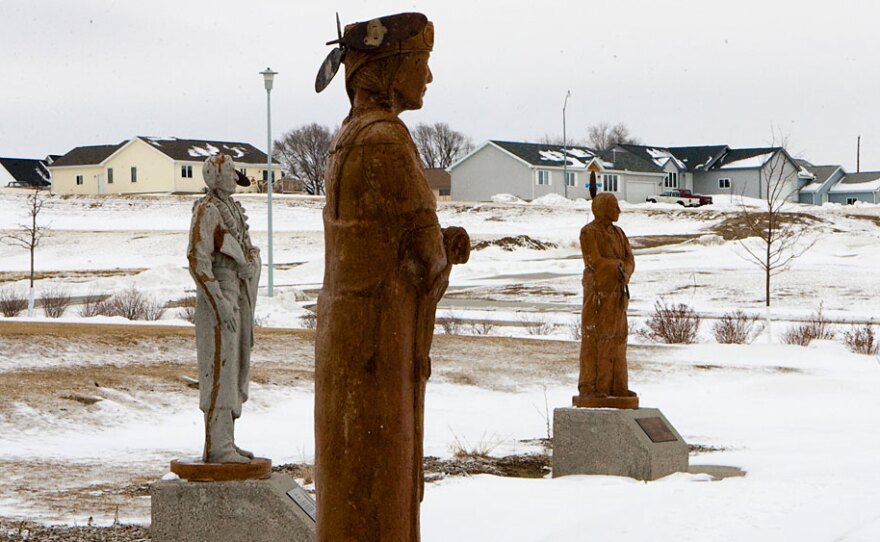Native American tribes across the country are buying back land where their ancestors lived and putting it in federal trusts. It often makes that land exempt from local and state taxes. That's leading to tensions in the counties that suddenly experience budget shortfalls as revenue streams disappear.
Acres of softly rolling farmland scattered with pools of melted snow and thick mud seem like an unlikely place for a tax battle. But in Thurston County, Neb., the Winnebago tribe has bought nearly 4,000 acres land, which the tribe is trying to get off the tax rolls.
That would mean Thurston County couldn't collect taxes on it, and that doesn't sit well with some of the locals.
Residents Butting Heads
Farmer Teri Lamplot and her husband Joel, who are members of the National Association of Counties, say they've spent years trying to get the federal government to provide tax credits to counties that have native land in trust.
"All of the burdens are still there when you remove that tax base," says Teri, a Thurston County supervisor, while she sips coffee at Popo's Drive-in restaurant in the county seat of Pender.
She adds, "And what ends up happening is everyone else that does not have the luxury of being able to just take their land off the tax roles and not pay taxes anymore, the rest of those people have to bear the burden, and it's not right."
But many tribal leaders disagree.
Tribes across the country have put upwards of a million acres in federal trust since 1998. Besides the Winnebago, the Pawnee tribe in Oklahoma has 1,600 acres of land in trust. Three tribes have bought land around Bear Butte in South Dakota's Black Hills. According the Bureau of Indian Affairs, the Navajo tribe holds the most acres in trust at just under 18 million.

Kenny Mallory, vice chairman for the Winnebago tribe, says thousands of acres of former tribal land are now providing taxes for the county. He says the land should have never been on the tax rolls in the first place because members of his tribe were tricked out of land ownership in the 1920s.
"A lot of times Indians owed their grocery bills -- they wouldn't pay their grocery bills. Guess what they used for collateral? Land!" he says. "And it was taken -- just like that."
He adds, "It never should have been the case, but we've had some bad agents through history. We've had bad Indian agents that were in cahoots with the farming community. We weren't educated then like we are today."
Getting Along
Winnebago tribe member Danelle Smith is a partner in a law firm handling Native American cases around the country, including the Winnebago's. She says there are opportunities for the tribe to work with the county government.
"There's a lot of biases and assumptions, I guess, about what one or the other will or won't do or whatever. And in my view, we're all neighbors," she says, laughing. "We all live there. Everybody has the same interests in having a good, safe, healthy community. We want economic development activities like anyone else wants for their hometown."
In an odd twist Smith also serves on the Thurston county board of supervisors. Leonard Peters heads the board, and he says because of the tax issue it’s difficult for the three Native Americans who serve on the board to support both county and tribal governments.
"It's something that's really hard for them to do and hard for us to accept, I guess. Because whenever they put land up for trust, we oppose it for obvious reasons. We're going to lose tax revenue," Peters says.
Last year, it would have cost Thurston County $200,000 if all the land the Winnebago tribe bought in recent decades was put in trust. About half of that money would go to schools. The rest would fund everything from roads to fire protection. While it's just a small part of the $11 million in property taxes collected in this northeastern Nebraska county, it's enough to continue the controversy of taking tribal land off the tax rolls.
Copyright 2022 Nebraska Public Media. To see more, visit Nebraska Public Media. 9(MDAzMjM2NDYzMDEyMzc1Njk5NjAxNzY3OQ001))





